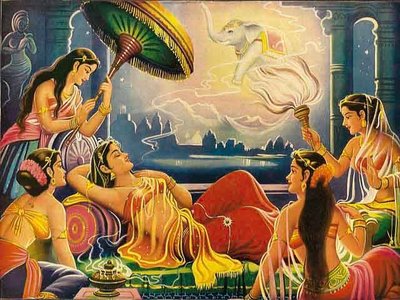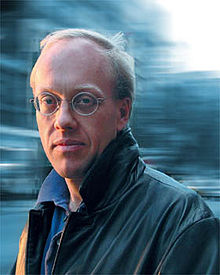Waking Up From Dreams & How Chris Hedges (On War, Art, and Being a Soccer Mom) Helps me Work it Out

When Queen Maya woke up from her dream of a white elephant, she was pregnant with the Buddha. I wonder what’s in store for me….
Part I
My neighbor, Claude, committed suicide last weekend. He was in his 60’s diabetic, super bummed to be riding around in his scooter thing. I always avoided him and his wife, but T, being the friendly one in the family, chatted with him a bunch about his health, our lawns, soccer, and then, most recently, the strip of land we were going to buy from him for a new septic system. Claude drove a red truck, which had, in the last few years, acquired a handicapped sign hanging from the rear view mirror. One time we happened to meet at the mailboxes, us on foot, him in his red truck, and it was winter. He cooed, as he often did, in his French accent, about how big A was getting, who would just smoosh her face into my coat. And he said we could use his big hill for sledding. That was nice, I thought.
So last Sunday, July 1st, was it for Claude. He had had enough. Of what exactly, I don’t know, but he must have been pissed because he shot himself in the garage. With his wife upstairs.
I keep thinking about Claude as I run around the Catskills, taking A to swim lessons, tennis lessons, the Native American museum in the city, Chinatown, my in-law’s country club, our little man-made lake beach, the Margaretville town fair. Worrying about things like how, oh how, will I use up all our CSA (Community Supported Agriculture) veggies this week? Or, goddamn, I want to lie down on my stomach to read Richard Ford’s new book, Canada (which I finally gave up on…how many times can the phrase “rob a bank” appear in one novel? Bo-ring!) while A and her friend play at the beach, but how the hell am I supposed to get sunscreen on my back? I do work for a living, but it’s online teaching, which I can do from anywhere at anytime….so…..
It’s not like I don’t have bigger problems, especially in the colder months, but this kind of life, sun beating down, food-focused, structured but relaxed, how do you say….suits me. Especially when tennis camp runs from 8:30 to 2:30 and I get to sit and do this.
However, having a life that suits me? Now, that’s another matter. In the midst of happiness, or even just my good-enough, but clearly super privileged life, I slap (yes, slap) myself back to”reality,” calling to mind “the rest of the world” and their brutal suffering (Claude!). What are your priorities, I scold myself. What happened to the Zen warrior devoted to immersion dharma practice, who spent years living in a monastery, chanting that sentient beings are numberless, I vow to save them? (While something about those words has always felt weird to me, the tension of the paradox saves it), offering the merit of every mindful act to the hole in someone else’s heart? Have I forsaken all beings for one? Me? Or, ok, two? My daughter and I? And sometimes T?
There are so many different kinds of dreams.
I vow to wake up from each and every one.
Part II
I recently gave my unabridged Chris Hedges interview to my dear friend and editor of the Mountain Record, the Zen Practitioner’s Journal (which I edited when I lived at the monastery), because they are doing an issue on morality, and he has plenty to say on the matter. The edited version ran in The Sun a few years back, but there is much more where that came from. Especially about healing, of which he, a long time war correspondent and generally in the mix kind of guy, needed plenty. When I asked him how he came back from what he called his “breakdown,” a black hole, he answered,
Mostly by connecting with my kids. Becoming a soccer mom. That did it. I mean it was all those little things. Making school lunches and going to school plays and picking them up and going to their track races. And that more than anything, I think, healed me.
I would never be so brazen as to suggest that I have experienced the kind of trauma that Chris Hedges (Claude?!) has, or that I am anywhere near the devoted worshiper of justice or compassion that he is. And yet, Lord knows I have my demons. And have tried, really tried, to find a way to reach others. And schlepping the girl in the heat of mid-day July, just because I love it, heals me.
So thank you, Mr. Hedges, for coming back from the most brutal hell realms imaginable to transform into a dad.
For more about Chris Hedges, the very cool man that he is, here is the introduction I wrote to the interview:
As a Pulitzer Prize–winning journalist for the New York Times, National Public Radio, and other media outlets, Chris Hedges has spent much of his adult life on the front lines, reporting on war. He has borne witness to atrocities and given a voice to victims of oppressive regimes around the globe. His writing paints such a clear picture of war that it is sometimes difficult to read.
As a boy, instead of reading comic books or The Hobbit, Hedges immersed himself in works about the Spanish Civil War and dreamed of fighting the fascists like his hero George Orwell. But he didn’t start out to be a war correspondent. Hedges grew up the son of a Presbyterian minister, and in 1975, six days after having graduated from Colgate College, he packed up to attend Harvard Divinity School. While working toward his degree, he accepted a position at a church in Roxbury, a poor, predominantly African American Boston neighborhood. Hedges preached on Sundays, worked with inner-city youth, and harbored high hopes of helping people. But he discovered that the “gentle pastor” routine was not going to work for him there. The neighborhood boys challenged his authority and made threats, and he got tough, cursing at them and even getting physical, then hating himself for it.
One day Hedges discovered that two boys, both heroin addicts, were waiting in his house to kill him. It was time for him to go — and it was then he realized that he could go, whereas the boys he “served” could not: when it came down to it, he was one of the privileged, the oppressors. It was a turning point in his life. In his book Losing Moses on the Freeway: The Ten Commandments in America (Free Press), he writes, “The darkness I discovered in Roxbury was my darkness, our darkness. . . . It is knowledge of this darkness alone that makes faith possible.”
From there Hedges went out to become a war correspondent, first in Central America, then in “refugee camps in Gaza; the un feeding stations in the southern Sudan; and the cold, murderous streets of Sarajevo.” After many years of living in gruesome and brutal war zones, Hedges realized he was suffering from post-traumatic stress disorder, and he decided to take a break. He reconnected with the ordinary life of work and family and allowed himself to be warmed again by human contact.
Hedges lives in New Jersey with his wife, actor Eunice Wong, and their three young children. He is the author of numerous books, including American Fascists: The Christian Right and the War on America (Free Press); War Is a Force That Gives Us Meaning (Public Affairs); and, most recently, I Don’t Believe in Atheists (Free Press). In the acknowledgments of his latest book, he writes of his family: “They matter most. This is just a book. They are my life.”
In addition to writing books and articles, Hedges lectures and has a weekly column on TruthDig.com. In person he projects the kind of passion that used to be called “religious.” He is serious but gentle, angry but wise.
And the entire interview is here:
https://isthismychair.com/

